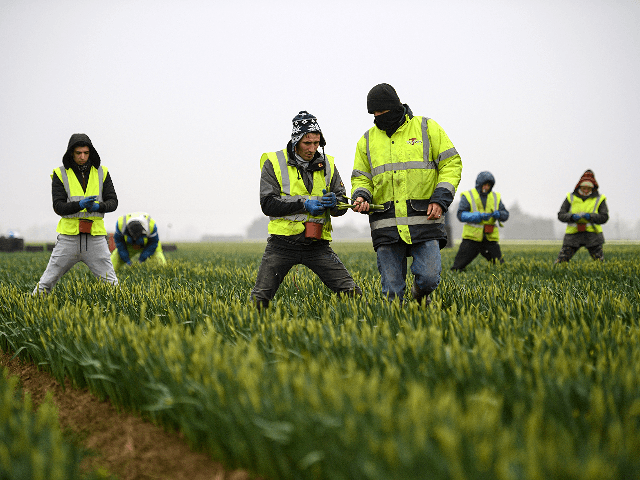Boris Johnson’s government is scrapping the ‘Pick for Britain’ drive for British farm workers and increasing migrant recruitment to 30,000, with hundreds to come from the likes of Belarus and the Russian Federation.
The Tory government launched the ‘Pick for Britain’ campaign in 2020 as the COVID-19 pandemic began in earnest, resulting in restrictions on international travel despite their own efforts to put off halting travel from coronavirus hotspots such as Italy, Iran, China, and even Wuhan itself until well after the disease had become endemic.
With hundreds of thousands out of work or furloughed on reduced pay across the country, the government made a great show of inviting people to come into the fields, with the Queen’s heir, Prince Charles, backing the scheme in a public message which recalled the wartime Land Army.
Tens of thousands of Britons answered the call — but few, in the end, were actually recruited by bosses, with the Tories making arrangements for them to fly in migrants on crowded aircraft despite the pandemic to do the work as usual.
Now, with The Grocer reporting that as few as 5 to 11 per cent of picking jobs were filled by Britons last year, the Tories have quietly binned the scheme, and are instead increasing the number of migrants being flown in to some 30,000, with cheap workers being recruited “to come quarantine-free to the UK” not just from low-wage EU member-states such as Romania and Bulgaria, but even the likes of Belarus and Russia, according to The Telegraph.
The increased cheap foreign labour drive, which comes as a great many Britons remain out of work, has been blamed by some on Britons’ supposed distaste for agricultural labour — despite such seasonal labour having been commonplace in the country well within living memory — but reports while ‘Pick for Britain’ was still active indicate that this “too lazy” stereotype is inaccurate.
Some would-be farm workers, for example, found that agri-businesses were telling British hopefuls that they “will need to speak Romanian and/or Bulgarian fluently” in order to fill positions, and the government’s Department for Environment, Food, and Rural Affairs (DEFRA) listed requirements that workers must live on-site, even if they lived nearby to farms — moves that led some to accuse ‘Pick for Britain’ of having been “designed to fail”.
One Briton who did make the cut described how “Despite being in the throes of a deadly pandemic, the farm owner refuses to supply the bathrooms with hand soap” in accommodation “seething with mould and littered with mouse droppings” and with had no running water, because they were not hooking up to the mains.
Rent for this accommodation, which is very often shared, is deducted from workers’ pay, and British applicants with their own camper vans complained they were not allowed to bring them to live in.
“It seems it is very much geared up for migrant labour. We are not looking for special treatment, but the whole system needs to have some flexibility and not just have this blanket approach,” said one British applicant.
The chair of British Summer Fruits, Nick Marston, admitted that bosses’ business model had indeed been “structured around a non-UK workforce for many years”.
“Yet again, employers say ‘jump’ and the Government responds with ‘how high?'” said Alp Mehmet, chairman of the Migration Watch UK think tank, of the latest increase in agricultural migrant workers.
“Why not pay a bit more, improve conditions and look locally before targeting the recruitment of those desperate to flee dictatorial countries like Belarus?” he suggested.
Despite the Vote Leave campaign which Boris Johnson fronted in 2016 running in large part on a platform of immigration control, one of the first things he did on becoming Prime Minister was drop the Tories longstanding — but never met and likely insincere — pledge to reduce net immigration “from the hundreds of thousands to the tens of thousands”.
He has also presided over a significant rise in illegal immigration, a dramatic fall in deportations of illegal aliens and foreign criminals, and created many new immigration routes to Britain at the same time as opening a pathway to citizenship for millions of Hong Kongers.

COMMENTS
Please let us know if you're having issues with commenting.